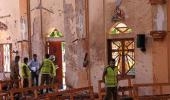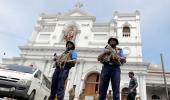Authorities released photos of 6 suspects, including 3 women, and sought information regarding them from the public.
Security has been beefed-up around 'a certain category of mosques' after intelligence warning that the Islamist extremist group blamed for the Easter blasts was planning an attack on them during Friday prayers.

Sri Lanka's Defence Secretary Hemasiri Fernando resigned on Thursday over his failure to prevent the Easter blasts that killed 359 people even as Prime Minister Ranil Wickremesinghe said authorities were targeting the 'sleepers' who could trigger another round of bombings.
Authorities also released photographs of six suspects, including three women, wanted for their involvement in the attacks and sought information regarding them from the public.
Nine suicide bombers, believed to be members of local Islamist extremist group called National Thowheed Jamath (NTJ), carried out the devastating blasts that killed 359 people and wounded more than 500 others.
Defence Secretary Fernando handed over his resignation letter to President Maithripala Sirisena on Thursday.
President Sirisena had asked Fernando and Inspector General of Police Pujith Jayasundara to quit after their failure to prevent the blasts despite having prior intelligence.
Facing public criticism for not acting against Islamist extremist groups in the island nation, Prime Minister Wickremesinghe said some of the suspected attackers responsible for the Easter bombings were being monitored by the country's intelligence services.
But authorities did not have 'sufficient' evidence to place the suspected attackers in custody prior to the attacks, he said.
Top officials have acknowledged that Sri Lanka received intelligence about possible terror strikes ahead of the attacks, but both President Sirisena and Prime Minister Wickremesinghe have said that they did not receive the information.
Wickremesinghe told CNN that he did not rule out the possibility of more attacks in the country.
He said authorities were now focussing on 'sleepers' -- terrorists who could activate another round of attacks.
"Police and security forces are rounding up those involved, but they're also rounding up the sleepers, those used on second and third rounds (of attacks)," he said.
"The danger has come down drastically, (but) we do have to pick up some more sleepers, which we will do in the next few days."
He said that security services were acting out of an abundance of caution, and that should even one militant slip through the net, the damage could be widespread.
"It is a precaution that we are taking, we want to be sure we have everyone in," Wickremesinghe said. "They are worried that one or two could get into a church -- (even) one person can do a lot of damage."
The Lankan authorities have intensified their search operations with the help of the army and arrested 16 more suspects.
Officials said that with the fresh arrests, the total number of suspects under their custody has risen to 76.
President Sirisena has said that 139 people have been identified as suspects in connection with the attacks.
Addressing an all-party conference, Sirisena said that a Combine Operation Centre will be established within the defence ministry for the enforcement of the country's security measures from Friday.
Many of the arrested people have suspected links to the NTJ, the group blamed for the bombings.
However, the NTJ has not claimed responsibility for the attacks. The Islamic State has claimed responsibility for the attacks.

Meanwhile, security has been beefed up around 'a certain category of mosques' after intelligence warning that the Islamist extremist group blamed for the Easter blasts was planning an attack on them during Friday prayers.
A letter, signed by DIG Priyantha Jayakody on behalf of Inspector General of Police Jayasundara, warned that the group which had carried out the Easter blasts was planning an attack on mosques on Friday, the Times Online reported.
The letter dated April 24, 2018 said a certain category of mosques identified as 'Awliya Mosques' could be possible target for these attacks.
"Security has been tightened in the vicinity of all mosques owing to these possible attacks. Therefore, the public need not worry," Jayakodi said.
The letter was addressed to the Presidential Security Division, the Special Security Division, and the Prime Minister's Security Division urging that the matter be brought to the immediate attention of the relevant authorities.
Chairman of the Dewatagaha Mosque in Colombo said that the State Intelligence Service has informed him of a possible threat by the group, which was involved in the Sunday's carnage.
He said that intelligence officers have also informed him that other mosques too would be warned of a possible attack in order for devotees to remain vigilant of possible threats.
Minister of Muslim Religious Affairs Abdul Haleem has requested the community members to avoid gathering for congregational prayers this Friday.
The Archdiocese of Colombo Thursday suspended all Catholic church services because of security concerns.
A prominent spice trader and father of two suicide bombers, Mohamed Yusuf Ibrahim, was taken into custody on suspicion of aiding and abetting suspects, police spokesman Ruwan Gunasekera said.
Sri Lanka has also suspended its plans to grant visas on arrival to citizens of 39 countries.
"We have now decided to hold it for the time being in consideration of the current security situation," Tourism Minister John Amaratunga said.
"Investigations have revealed foreign links to the attacks and we don't want this facility to be abused," Amaratunga added.
The visas on arrival pilot programme was part of a larger initiative to increase tourist arrivals to the country during the six month off-season period from May to October.
*****
Father of 2 suicide bombers arrested on suspicion of aiding and abetting sons
A Sri Lankan spice tycoon, the father of two of the suspected suicide bombers, was arrested on Thursday on suspicion of aiding and abetting his sons carry out the deadly terror attacks.
Spice merchant Mohamed Yusuf Ibrahim's two sons -- identified as Ilham Ahmed Ibrahim and Imsath Ahmed Ibrahim -- allegedly detonated their explosives at the Shangri-La and the Cinnamon Grand hotels on Sunday.
Police are holding the brothers' father on suspicion of 'aiding and abetting' his sons, the CNN reported.
According to media reports, investigators are also searching the spice trader's mansion in Colombo -- which was the site of the eighth blast -- for evidence of the attacks. Three police officers were killed in the blast at the mansion.
Elder brother Ilham, who detonated a device at the Cinnamon Grand Hotel, was previously arrested by police and then released, a Sri Lankan government spokesman told CNN.
The majority of the Easter Sunday suicide bombers were from well-to-do Sri Lankan families and they were well-educated, including one who studied in the United Kingdom, State Defense Minister Ruwan Wijewardene said on Wednesday.
*****
Bengaluru under security blanket
In the wake of the terror attacks in Sri Lanka, the police in Bengaluru on Thursday stepped up security and initiated elaborate measures to prevent such an
incident.
In addition, the police have decided to set up an anti-terrorist cell in the city and have written to Karnataka government in this regard.
As part of the measures, the police convened a meeting with head of variousinstitutions, religious places and commercial establishment with a footfall of more than 500.
Speaking to reporters after the meeting, city police commissioner T Suneel Kumarsaid he has instructed deputy commissioners to gather information on religious places where lots of people congregate.
The deputy commissioners, in turn, have been directed to instruct the managers of malls and hotels.
Further, the commissioner decided to hold a meeting with the trustees, board members and managers of religious institutions and commercial places.
Kumar said the Sri Lanka experience revealed that many people went unchecked.
"The Sri Lanka experience tells us that the people were moving casually with baggage and without any security check," he said.
"We want to alert our hotelier-friends to escalate the security measures like installing baggage scanners. Physical-checking and frisking of each and every individual was necessary," he said.
*****
Islamist extremist group may have planned Easter attacks for 7-8 years: Fonseka
The Islamist extremist group behind the blasts would have been planning the suicide attacks for 'at least 7 to 8 years' and could be led by someone having the calibre of slain Liberation Tigers of Tamil Elam supremo Velupillai Prabakaran, according to Field Marshal Sarath Fonseka.
Speaking during the emergency debate in Parliament, Fonseka, who led the Sri Lankan military that vanquished the Liberation Tigers of Tamil Eelam in 2009, was quoted by the media as saying that the Easter attacks were a long planned one.
"It took 12 years for the LTTE to carry out a suicide attack on the then Defence Minister Ranjan Wijeyaratne. Therefore, these people must have planned the recent attack at least seven to eight years ago," he said on Wednesday.
"The LTTE's terrorism was markedly different as it was an organisation fighting to divide the country. Its motives were political, whereas this group is pushing a religious agenda," the 68-year-old Field Marshal said, apparently referring to NTJ.
Daily Mirror quoted Fonseka as saying that the group that carried out Sri Lanka's worst terror attack, might have already established a leader of Prabakaran's calibre.
Prabhakaran is generally credited with perfecting the recruitment and use of suicide bomber units of Tamil Tigers against the Lankan military and political leaders.









 © 2025
© 2025